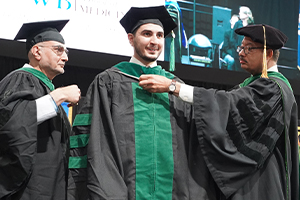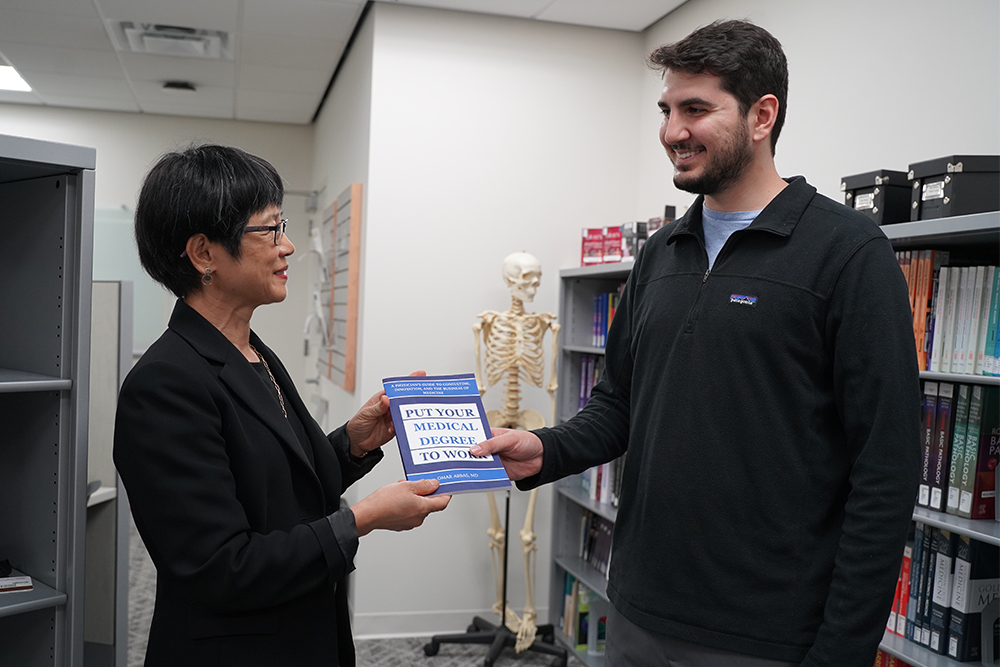An OUWB alumnus has penned a book that aims to help physicians use their medical degrees in ways they “never thought possible,” including development of biotech, consulting, and more.
Omar Abbas, M.D., OUWB ’22, is the author of “Put Your Medical Degree to Work.”
Available on Amazon, the book sets out to help medical students and physicians understand how their respective medical degrees can “open more doors than you ever imagined — beyond the clinic, the hospital, or the exam room.”
“There is a need to educate physicians and other health care professionals that these opportunities exist,” he said. “The more people that know about this side of medicine, the more innovation we can create, and ultimately benefit a greater number of patients.”
‘Passion for innovation’
Abbas was born in Michigan and his family moved to Saudi Arabia when he was six. He returned to the U.S. for college and attended Michigan State University as an undergraduate.
While studying microbiology and epidemiology at MSU, Abbas said he received his first taste of what it might be like to work in medicine. He took it further and gained his first clinical experiences while volunteering and shadowing physicians.
It all led to Abbas’ deciding to become a doctor. He was drawn to OUWB for numerous reasons: the collaborative environment; class sizes; and proximity to family.
“And the biggest draw was the affiliation with Beaumont Health (now Corewell Health),” he said.
Abbas said he is “really happy” with the choice, too.
“I’ve made a lot of lifelong friends — students, faculty, and residents,” he said. “And I loved the atmosphere and flexibility. You could pursue anything you wanted to pursue. I never felt like I was told I couldn’t do something.”
Abbas matched at University of Iowa Hospitals and Clinics.
And his “true passion for innovation” has not only provided him with a tremendous amount of experience but serves as the basis for his book.
‘No one teaches you directly’
 |
|---|
| Abbas is hooded during the 2022 OUWB Commencement by Pierre Morris, M.D., associate dean, Clinical Education, (right) and his father, Mujahed Abbas, M.D. (left) |
Abbas started his residency training in neurology, but after a couple of months decided to reapply for pathology.
“There were various reasons, but mainly I wanted to take a step back and explore other sides of medicine … diagnostics and the innovation side of things,” he said.
During the transition period, Abbas became involved in consulting, investment due diligence, and “basically building experience and exploring things outside of what we’re taught in medical school and traditional practice.”
Today, he is a chief resident in the Department of Pathology at Henry Ford Health. He also is still very much involved in innovation, and continues to serve as a consultant and advisor to companies of all sizes, beginning with startups.
Those experiences serve as the basis for his book.
“As I have gained these different experiences on the innovation and business side of things, a lot of my friends in medical school or in residency have asked me how I got into it,” he said. “These are things no one teaches you directly.”
For example, if a person or company invents a new and improved kind of stethoscope, the inventors are going to want input from cardiologists on variables like design, research studies, and/or to perhaps even how to most effectively market the device.
“At every step of the process … there is a role that a specialist or physician with knowledge in that area can contribute to,” said Abbas.
“Put Your Medical Degree to Work” addresses this and more. According to the description on Amazon, Abbas uses “real-world case studies, specialty-specific insights, and clear step-by-step advice” in addressing:
- How medical products move from idea to market — and where doctors fit into every step.
- What non-clinical roles exist (and how much they really pay).
- How to position yourself on LinkedIn, in interviews, and at conferences.
- The truth about consulting, MSL roles, digital health, entrepreneurship, and venture capital.
- Where to find real opportunities, and how to land them — even with a full-time clinical job.
At just over 100 pages, Abbas said he intentionally kept the book “short and sweet,” so that it doesn’t take a lot of time to read.
And he knows exactly what he wants readers to take away from it.
“I hope readers feel empowered because they have much more knowledge and expertise to contribute beyond clinical practice,” he said.








